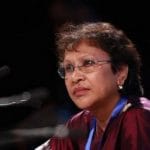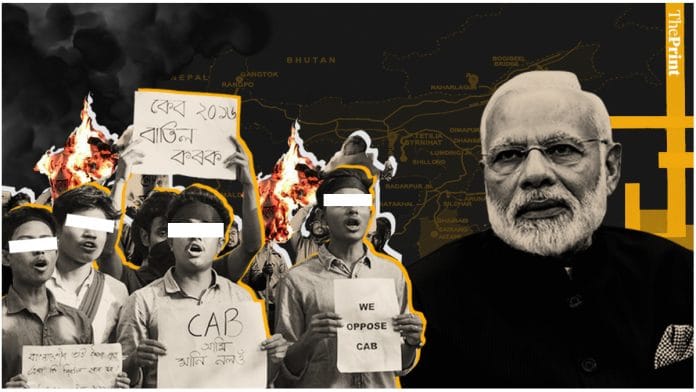The Union cabinet Wednesday cleared the Citizenship (Amendment) Bill that seeks to grant citizenship to non-Muslim refugees from Pakistan, Bangladesh and Afghanistan. The bill, which the Narendra Modi government wants to push through alongside a nation-wide NRC, is facing resistance in the northeast states that have suffered ethnic violence. CMs of these states met Home Minister Amit Shah Saturday to voice their concerns.
ThePrint asks: Will citizenship bill create havoc in northeast rife with ethnic violence for decades?
Northeast states must be excluded from the implementation of Citizenship (Amendment) Bill
 Bano Haralu
Bano Haralu
Senior journalist
I think that the Citizenship (Amendment) Bill or CAB has not been understood clearly by people in the northeast. Has this bill has been introduced to protect citizens or give legal migrants legitimacy?
India’s northeast has been grappling with the fear of a demographic change. The most contentious thing is that this bill is based on religious identification. That identity is dangerous since it plays with the balance of society. The northeast has not witnessed discrimination based on caste, religion or food habits. However, the issue of land has been sensitive.
In the context of Nagaland, there are two policies – Article 371(A) and the practice of inner line permit – which haven’t been able to control migration in the state. How will the CAB help? Unrest may not manifest right now, but 10 years down the line people will raise questions. For some people, this will become an extremely convenient tool to cause disharmony in society.
This issue affects the land and its resources. In this region, people don’t have anything else but the land and what they yield from it. If the natural balance is disturbed, people will rise and no amount of assurance from politicians can help. Northeast states must be excluded from the implementation of the CAB.
CAB will lead to unrest in northeast and Amit Shah will likely do a Kashmir
 Patricia Mukhim
Patricia Mukhim
Editor, The Shillong Times
The CAB has the potential to create unrest in all northeastern states, particularly Tripura, which is a homeland of indigenous Borok people but has been overrun by Bengali-speaking people from Bangladesh.
Home Minister Amit Shah has said that states with Sixth Schedule and where Inner Line Permit (ILP) and Article 371 are in place, will not share the burden of accommodating citizens under the CAB.
But it’s a given that the CAB will lead to public unrest. Amit Shah will likely do a Kashmir in the northeast too and use uniformed personnel to quell dissent. Many northeastern states are already under the Armed Forces Special Powers Act, hence it should not be difficult to extend that Act wherever trouble is brewing.
Tripura’s indigenous tribal population is 31 per cent, according to the 2001 Census. The royal family scion, Pradyot Debbarma, wants a National Register of Citizens (NRC) so that people of Bangladeshi origin who have entered Tripura illegally can be identified and sent back.
In Assam, where different figures have been floated about the number of illegal Bangladeshi settlers, who are mostly Muslim, people are up in arms to deport 19 lakh people who have been excluded from the final NRC list.
In other northeastern states – Nagaland, Manipur, Meghalaya, Mizoram, Arunachal Pradesh, all of which have their fair share of illegal immigrants – there is a strident belief that the CAB is an instrument meant to deliver electoral goods to the BJP but at a huge cost to the indigenous tribal population.
Chakmas in Mizoram make up the non-indigenous population and are fearful of Citizenship Amendment Bill, but for different reasons

Adam Saprinsanga Halliday
Journalist
The case of Mizoram is slightly different from that of Assam, Meghalaya and some other northeastern states. In Assam, for example, the native population contends that the non-indigenous population is largely made up of people from Bangladesh. But in Mizoram, the native population contends that the non-indigenous population is made up of Chakmas. This is the main point of contention in Mizoram: there is widespread fear that the Citizenship Amendment Bill may legitimise the community’s presence.
Chakma groups have “opposed” the CAB, saying “it has become an instrument to vilify the community as ‘foreigners’ and beneficiaries of the CAB.”
Even in the case of Arunachal Pradesh, members of the Chakma community are not accepted as citizens. This singularity is prevalent in both Mizoram and Arunachal Pradesh.
The Inner Line Permit (ILP), which is in force in both these states as well as in Nagaland, disallows people from other areas to settle in a protected area. However, it is feared that the ILP would be less effective in Mizoram where Chakmas already have an autonomous district council, the legality of which has been contested in recent times.
The case of documentation is a complex one. People living in an area for years may not consider documents their utmost priority but those who have migrated will want to ensure their documents are in order. There is fear that the CAB will throw up these inconsistencies in society.
We are not against Hindus, Muslims or anyone else, but only illegal Bangladeshis
 Samujjal Bhattacharya
Samujjal Bhattacharya
Chief Advisor, All Assam Students’ Union
The Citizenship Amendment Bill is violating Assam’s historical accord. This bill is communal and unconstitutional, which is why we are protesting against it. In the case of Assam, people are accepted as citizens if they came to the state before 1971. Assam is a small state and cannot take the burden of a large population. It is not a dumping ground for Bangladeshis who enter illegally.
This is a question of citizens and non-citizens. No non-Indian can stay in northeast India. The central government is imposing this on us. We can’t live like second-class citizens in our own states. I should clarify that we are not against Hindus, Muslims or anyone else. We are against illegal Bangladeshis.
As far as the NRC is concerned, this process is not new to Assam. The result of the Assam NRC made us unhappy and it should be corrected with a new NRC.
The CAB might be good for the country but it is bad for Assam and we will continue to protest against it.
In Mizoram, amended Citizenship Act if passed will have lesser impact compared to Assam

Henry L. Khojol
Reporter, The Telegraph & The Mizoram Post
The amendment to the Citizenship Act is likely to have a serious demographic impact in the northeast, especially Assam, which has been facing influx of illegal migrants from Bangladesh for decades. Several organisations and student bodies, including the North East Students’ Organisation, have been opposing the bill. If enacted, it is likely to face stiff opposition from civil groups unless a proviso to safeguard the region from the bill is incorporated.
As far as Mizoram is concerned, the proposed legislation will have a lesser impact compared to Assam. But this does not mean that the Christian-dominated state is free from illegal influx or the fallout of the bill.
Unlike in Assam, where migration of Bangladeshi Hindus has been a decades-old issue, the main concern in Mizoram is the ‘illegal influx of Buddhist Chakmas’ from Bangladesh, which the Mizos see as a big threat that can make them into a minority.
According to former Mizo Zirlai Pawl (MZP) president L. Ramdinliana Renthlei, there are over 30,000 illegal Chakma migrants in the state and these migrants would automatically become Indian nationals if the bill is passed.
On the other hand, the proposed law is unlikely to attract illegal influx of Chakmas because the bill seeks to grant citizenship to non-Muslims who face persecution, and the Chakmas have never faced persecution in Bangladesh.
If the bill is passed without the proviso to safeguard the region, it will trigger yet another massive protest in Mizoram.
Also read: Modi’s new citizenship law will rip open the wounds of Partition
By Kairvy Grewal, journalist at ThePrint







CAB will again do a divide and rule act in whole N.E region.The Bengali speaking people, the Muslims, the Boros/Sonowals/Kocharis/and all the ethnic people will again engage themselves in a bloody war of existance !!And it is only because Amit Shah and Modiji!!!They will be historically blamed for this.
My knowledge of the incredible ethnic / linguistic diversity of the north east would fit onto a postage stamp. However, it is enough for me to recognise that this is one simmering pot that needs no fresh kindling being added below, no spices being chucked in from above. People who have access to the deepest troves of information and analysis should display a Sardar Patel like sagacity in dealing with this region. For that matter, on the broader national canvas, with subjects like the NRC and the CAB. The line between political advantage and national interest has got completely blurred. It needs to be etched with a statesman’s quills. Else there might be a lot of pieces to pick up.
That area also has racism problem, also role of Xian missionaries must be checked.
It might be worth your while to study which community practices ‘racism’ in the northeast and it will surprise you. I assure you it will not be the tribal communities.
Besides, Christianity does not teach or practice racism … it is the same faith where believers in Christ are told to “love thy neighbour as they self”.
And just as X-Mas is no greeting because there can be no Christmas without Christ … next time just say Christian missionaries, its not a dirty word.